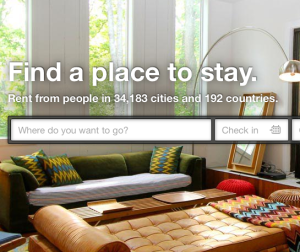Airbnb Cancels Reservation Because You Don’t Want To Post A Video Of Yourself
 One month ago, home-sharing service Airbnb began rolling out a program called Verified ID, which requires some U.S. users (and eventually people in other parts of the world) to go through a verification process that uses social media logins — either Facebook or LinkedIn — and offline proof of ID, like a scanned license or passport. But what if you don’t use Facebook or LinkedIn?
One month ago, home-sharing service Airbnb began rolling out a program called Verified ID, which requires some U.S. users (and eventually people in other parts of the world) to go through a verification process that uses social media logins — either Facebook or LinkedIn — and offline proof of ID, like a scanned license or passport. But what if you don’t use Facebook or LinkedIn?
This was the problem facing tech writer extraordinaire — and alumnus fellow at Harvard’s Berkman Center for Internet and Society — Doc Searls, when he and his wife recently tried to use Airbnb to book a room in Rome.
When Searls’ wife hit the new verification wall, she explained to the company that she doesn’t have accounts on either Facebook or LinkedIn. The answer is simple, says Airbnb.
“[Y]ou can create a video profile to serve as an alternative,” explains the company. “Your video will be visible on your profile as a live introduction of yourself to other Airbnb community members.”
The notion that a 30-second video would be of any value to actually verifying a user’s identity — along with the fact that this video would then become part of some semi-public profile — was a little much for Searls and his wife.
“[M]y wife and and I have been around identity systems development for a very long time,” he writes. “In my case I’ve keynoted nearly ever Digital ID World, and have co-hosted all sixteen Internet Identity Workshops. Neither of us have ever seen an identity verification routine that required making a video to share with others. We were, like… what?”
The couple’s refusal to shoot and post this video just to use a service they had come to love over the years meant that their reservation would be canceled.
And so Searls’ wife wrote to Airbnb, offering to verify her identity through personal cloud providers like Personal.com, Virtrue, OwnYourInfo, or a trust network like Respect Network or Qiy.
“I suggest that you take a look at some of these services that work on the side of the customer,” she wrote, “without exposing them to further surveillance and tracking of their personal data.”
Airbnb’s response was underwhelming:
“Please accept our apologies if our verification process caused you any distress. As we are constantly working on improving our product and services, I’ll pass your feedback on accordingly…
“Airbnb is a platform for connecting individuals interested in having unique and personalized experiences. This is how Airbnb differs from the norm, as not everyone on Airbnb operates their business outside of Airbnb the way a normal bed and breakfast would. Please consider that you will be staying in the home or residence of another individual. At Airbnb we’re constantly striving to improve the level of trust between our users to instill confidence in the transactions between our users. Our verification process was designed to help improve that level of trust and allow users to fully enjoy their experience on Airbnb.
“At Airbnb we’re constantly striving to improve the level of trust between our users to instill confidence in the transactions between our users. Our verification process was designed to help improve that level of trust and allow users to fully enjoy their experience on Airbnb.
“Recent positive reviews do count towards verifying your Online identity but the reviews you received did not satisfy our system’s verification requirements. Unfortunately, if you don’t have a Facebook or LinkedIn account, the video profile is the only alternative available at this point. We offer several alternatives in hopes that one will work for you, but we understand that these situations do arise. That’s why we offer you the opportunity to verify your account by recording a 30 second video in which you can introduce yourself to the Airbnb community.
“Please know that if you don’t want your video profile to be public, you can also record the clip using a digital camera or a smartphone and attach it to your response to this message. We’ll then verify your account without publishing the video.”
“This makes no sense to me,” writes Searls. “Are they saying Airbnb operates a social business, meaning one that places a premium on people exposing themselves to others, rather than on minimizing exposure? Are they saying that everybody in the Airbnb community is a potential ‘friend,’ and that’s why it makes sense to login with Facebook or Linkedin? And why the video? What’s to keep any community member from copying that video — or any personal information exposed through social media — and spreading it out on the open Web? Why would anybody trust Airbnb to keep that kind of thing from happening?”
He contends that Airbnb’s new system hurts and alienates both the host and guest by turning away customers who are uncomfortable with these new requirements, and by not giving Airbnb hosts the option of accepting unverified guests.
“Worse, it filters through only those customers who are comfortable exposing themselves through social media and in video performances,” he explains. “Do they really want to do that?”
Want more consumer news? Visit our parent organization, Consumer Reports, for the latest on scams, recalls, and other consumer issues.

